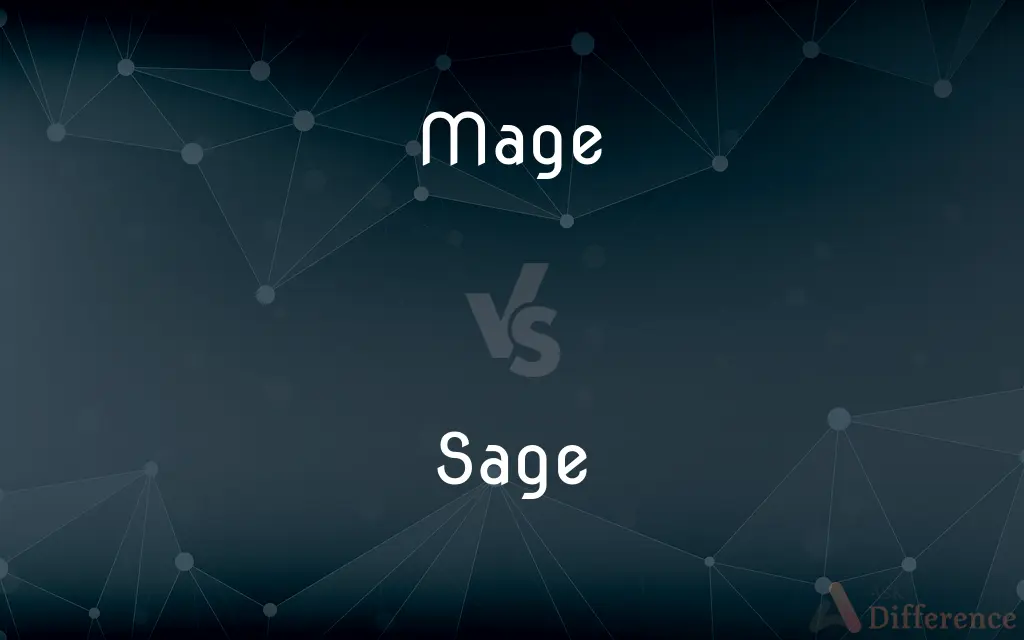Mage vs. Sage — What's the Difference?
By Tayyaba Rehman & Maham Liaqat — Updated on March 28, 2024
A mage is a practitioner of magic, skilled in manipulating supernatural forces, while a sage is a wise person known for profound wisdom and insight, often without magical connotations.

Difference Between Mage and Sage
Table of Contents
ADVERTISEMENT
Key Differences
A mage is often depicted in literature and mythology as someone who has mastered the arcane arts, wielding magic to alter reality or achieve tasks beyond the means of ordinary individuals. These practitioners can summon, bind, or banish entities, and manipulate the elements or the fabric of reality itself. On the other hand, a sage is recognized for their deep understanding, wisdom, and often moral guidance. Their knowledge is rooted in experience, observation, and contemplation, rather than the supernatural.
Mages typically undergo rigorous training in their craft, studying ancient texts, spells, and potions, and often serve roles that leverage their mystical abilities, such as advisors, healers, or warriors in fantastical settings. Whereas sages acquire their status through a lifetime of learning and reflection, often serving as teachers, philosophers, or counselors, guiding others through advice rather than direct intervention.
The power of a mage is usually external, drawing from the cosmos, nature, or deities, requiring knowledge of specific rituals or incantations to harness and control. In contrast, the sage's power lies within their intellect and moral compass, offering insights that can lead to enlightenment or solve complex dilemmas without the need for magical intervention.
Mages often occupy a space where the mystical intersects with the material world, engaging in battles, crafting magical items, or exploring the boundaries of their power. Sages, however, are found in the realms of academia, politics, or isolated contemplation, influencing through words and ideas rather than spells.
The societal role of mages can vary widely, from revered and feared individuals to outcasts and hermits, depending on their powers' nature and the societal context. Sages are generally respected and sought after for their knowledge and guidance, embodying the pinnacle of intellectual and ethical achievement.
ADVERTISEMENT
Comparison Chart
Definition
Practitioner of magic, skilled in the supernatural
Wise person known for deep wisdom and insight
Skills
Magic, spellcasting, elemental manipulation
Wisdom, moral guidance, philosophical insight
Power Source
External (cosmic forces, nature, deities)
Internal (knowledge, experience)
Role
Advisors, healers, warriors
Teachers, philosophers, counselors
Influence
Through mystical abilities and interventions
Through advice, teaching, and moral guidance
Compare with Definitions
Mage
Often part of fantastical tales and lore.
The ancient tome spoke of a mage who could bend time itself.
Sage
Often serves as a moral and philosophical guide.
The sage's teachings on virtue influenced generations.
Mage
A person who practices magic, often within a specific tradition or system.
The mage conjured a protective barrier with a flick of his wand.
Sage
Embodies the pursuit of knowledge and enlightenment.
As a sage, he spent his life in the pursuit of truth above all else.
Mage
Known for their ability to manipulate supernatural forces.
As a skilled mage, she could summon elemental spirits to her aid.
Sage
A person distinguished by profound wisdom and good judgment.
The village sage offered advice that resolved the long-standing dispute.
Mage
Their abilities can serve both benevolent and malevolent purposes.
The dark mage used his powers to terrorize the kingdom.
Sage
Recognized for their deep understanding of life and the world.
She was considered a sage due to her insightful interpretations of nature.
Mage
Mages may belong to schools or guilds to hone their craft.
He joined the arcane academy to train as a mage among peers.
Sage
Their wisdom is sought after in matters of significance.
Leaders would seek the sage's counsel before making pivotal decisions.
Mage
A magician or learned person.
Sage
One venerated for experience, judgment, and wisdom.
Mage
A magician or sorcerer.
Sage
Any of various plants of the genus Salvia of the mint family, especially S. officinalis, having aromatic grayish-green leaves.
Mage
A magician, wizard or sorcerer.
Sage
The leaves of S. officinalis used as a seasoning.
Mage
(obsolete) magus: a Zoroastrian priest.
Sage
Any of various similar or related plants, chiefly in the mint family.
Mage
A magician.
Sage
Sagebrush.
Sage
Having or exhibiting wisdom and calm judgment.
Sage
Proceeding from or marked by wisdom and calm judgment
Sage advice.
Sage
(Archaic) Serious; solemn.
Sage
Wise.
Sage
(obsolete) grave; serious; solemn
Sage
A wise person or spiritual teacher; someone of gravity and wisdom, especially, a teacher venerable for years, and of sound judgment and prudence; a grave or stoic philosopher.
Sage
The plant Salvia officinalis and savory spice produced from it; also planted for ornamental purposes.
Sage
Any plant in the genus Salvia
Sage
Any of a number of plants such as sagebrush considered to be similar to Salvia officinalis, mostly because they are small shrubs and have gray foliage or are aromatic.
Sage
(Internet slang) Word used in the email field of imageboards to prevent a bump of the post. Used as an option rather than a word in some imageboard software.
Sage in all fields
Sage
(Internet slang) The act of using the word or option sage in the email field or a checkbox of an imageboard when posting a reply.
Reminder to sage and report.
Sage
A suffruticose labiate plant (Salvia officinalis) with grayish green foliage, much used in flavoring meats, etc. The name is often extended to the whole genus, of which many species are cultivated for ornament, as the scarlet sage, and Mexican red and blue sage.
Sage
A wise man; a man of gravity and wisdom; especially, a man venerable for years, and of sound judgment and prudence; a grave philosopher.
At his birth a star,Unseen before in heaven, proclaims him come,And guides the Eastern sages.
Sage
Having nice discernment and powers of judging; prudent; grave; sagacious.
All you sage counselors, hence!
Sage
Proceeding from wisdom; well judged; shrewd; well adapted to the purpose.
Commanders, who, cloaking their fear under show of sage advice, counseled the general to retreat.
Sage
Grave; serious; solemn.
Sage
A mentor in spiritual and philosophical topics who is renowned for profound wisdom
Sage
Aromatic fresh or dried gray-green leaves used widely as seasoning for meats and fowl and game etc
Sage
Any of various plants of the genus Salvia; a cosmopolitan herb
Sage
Having wisdom that comes with age and experience
Sage
Of the gray-green color of sage leaves
Common Curiosities
How do mages acquire their abilities?
Mages typically acquire their abilities through study, practice, and sometimes inherent talent or a connection to supernatural forces.
Do mages work alone or in groups?
Mages can work both individually or within groups, such as guilds or orders, depending on their traditions and the story's context.
What is the societal role of a sage?
Sages often serve as advisors, teachers, and philosophers, offering guidance based on their profound knowledge and insight.
How do sages acquire their wisdom?
Sages acquire their wisdom through a combination of natural inclination, life experience, study, and often a philosophical or ethical pursuit.
Can a person be both a mage and a sage?
While uncommon, some fictional narratives feature characters that combine both deep wisdom and magical abilities, embodying traits of both mages and sages.
Do mages have a code of ethics?
In many narratives, mages follow a code of ethics or laws that govern the use of their powers, though this can vary widely.
How do societies view sages?
Societies typically view sages with respect and reverence, valuing their wisdom and guidance in various aspects of life.
What kinds of problems do sages solve?
Sages are often sought out to solve moral, ethical, philosophical, and sometimes political problems through their wisdom and insight.
What is the primary difference between a mage and a sage?
The primary difference lies in their source of power; a mage relies on supernatural abilities, while a sage's strength comes from wisdom and knowledge.
Can mages be evil?
Mages can be of any moral alignment, with some choosing to use their powers for malevolent purposes.
Is the wisdom of a sage always respected?
While sages are generally respected for their wisdom, their influence can vary depending on the cultural, historical, and situational context.
What kind of magic do mages practice?
The magic practiced by mages can range from elemental manipulation and summoning to spellcasting and enchantment, varying widely across different mythologies and stories.
Are mages always part of fantasy settings?
Mages are predominantly found in fantasy settings, though variations exist in folklore, mythology, and metaphorical uses in non-fantasy literature.
What is the role of a sage in decision-making?
Sages are often consulted in decision-making processes for their ability to offer deep insights and consider the ethical implications of choices.
How is the wisdom of a sage conveyed to others?
The wisdom of a sage is usually conveyed through teachings, written works, counsel, and personal example.
Share Your Discovery

Previous Comparison
Selfie vs. Groupie
Next Comparison
Infant vs. NewbornAuthor Spotlight
Written by
Tayyaba RehmanTayyaba Rehman is a distinguished writer, currently serving as a primary contributor to askdifference.com. As a researcher in semantics and etymology, Tayyaba's passion for the complexity of languages and their distinctions has found a perfect home on the platform. Tayyaba delves into the intricacies of language, distinguishing between commonly confused words and phrases, thereby providing clarity for readers worldwide.
Co-written by
Maham Liaqat















































